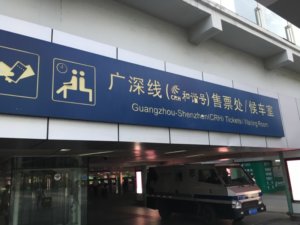Live from Guangzhou: Best execution is absolutely vital for success in China – here is why!
Here in Guangzhou, China, we discuss how to ensure best execution to Chinese customers, and how to reduce the latency – You cannot beat the firewall, but you can build sophisticated trading systems for increasingly demanding Chinese IBs and retail customers. Here is a comprehensive insight

If Shenzhen is the gateway to the South, Guangzhou is the city of opportunity that nestles behind that ultra-modern, technologically dazzling entrance to mainland China.
Here today in Guangzhou, a large second tier city in China’s Guangdong province, prominent and established companies from across the People’s Republic, along with senior executives from the offices of the Chinese subsidiaries of renowned Western companies are discussing the importance of China as what has become the number one focus for all retail FX industry participants from institutional prime brokerage, to technology integration providers, to retail brokerages and the vast introducing brokers and portfolio managers that provide gargantuan trading volumes via automated systems across China.

Meeting with Kelvin Zhao, Greater Head of China at Australia’s AxiTrader at today’s FX industry “Fortune Forum” conference in Guangzhou in association with FXWord, FinanceFeeds raised the subject of how China’s FX industry is becoming a domestic powerhouse, and that the entire country has become a magnet for the Western establishment in terms of building local presence in the form of Chinese entities.
Mr. Zhao, who heads the Chinese division of AxiTrader from the firm’s offices in Shanghai, explained “This really depends on which perspective you are looking at it from. In some respects, China can be looked at as an isolated market.”
“For example, when looking at the sales and customer facing departments of FX compamnies, local presence and local focus is essential beause of having to have the right language and knowledge base to be able to service local markets. Companies in China need to be able to access direct clients and IBs, so therefore local, Chinese-only divisions are necessary, however the majority of the real experts in the industry are in the UK or Australia, for example, hence that expertise is required for order execution technology and market connectivity” said Mr Zhao.
“Therefore, it is certainly important to have a very China-centric customer team and operational division, but asking Chinese companies to structure the execution, liquidity aggregation or platform connectivity, it becomes a different story” – Kelvin Zhao, Greater Head of China, AxiTrader
“In summary” continued Mr Zhao, “Any aspect of a brokerage business that services clients needs to be domestic but if you want advanced technologies and the expertise from professionals who understand how to hedge your books, structure execution technology and very importantly manage risk, have to rely on Western firms because they have been doing it for 30 years and have great experience.”
FinanceFeeds concurs that the execution management and risk aspect of the business is vital for Chinese entities because the level of retail order flow and volume of business is often intrinsically higher than outside China. FinanceFeeds has met several introducing brokers and portfolio managers (very few people trade their own accounts in China) across the entire country on many occasions, and can concur that $300 million in assets under management and a trading volume of approximately 100,000 lots per month is not unusual for many medium-sized IBs in the mainland.
Although China has become host to a large number of its own domestic FX firms, many of which have metamorphosed from being an IB with a large client portfolio away from sending the execution outside, instead opting to conduct their own execution of trades, it is clear that the Chinese branches of established firms from outside China are absolutely preferred here in the mainland.
Mr. Zhao understands that AxiTrader is regarded across the country as a very high quality Australian brand, which is vital in the demanding and analytical market that China is these days.
“Chinese institutional and retail partners associate AxiTrader with high quality, and Australian good business ethic” explained Mr Zhao.
“We have been building up the brand in China since we established the Wholly Owned Foreign Enterprise (WOFE) in Shanghai in June 2016, and our ethos is to build a fair market and provide a ‘best execution’ environment” he said.
“Client concerns in China often center around execution. Sometimes there can be slippage around important announcements but Chinese traders do not want to experience trading delays, which are prevalent among Chinese brokers” he said.
Indeed, one of the bugbears of attempting to operate a low latency trading environment in China is that the government firewall, which censors all internet activity, adds a layer of latency to every internet activity as it goes through a checking process. This is even noticeable when using Western applications from within China that are not subject to an outright block, such as Skype. Sending messages in Skype from within China often take a few seconds longer to deliver, as they are being checked for sensitive keywords before delivery.
This is at best annoying, but in a trading scenario, it can be detrimental. Add that to a distance from the major data hosting centers of Slough (Equinix LD4), New York (Equinix LD3) and a reliance on hosting at TY3 in Tokyo which is far less prominent among all firms and is still distant and outside the firewall, and a real solution to lower the latency is required.
“Our advantage in this respect is that we concentrate very heavily on FinTech development” said Mr Zhao.
“In Sydney around one third of the staff are IT systems engineers so we view ourselves as a FinTech firm. Although overall trading speed throughout China has improved recently, many brokerages in China have 300 millisecond delay due to hosting proximity and of course the firewall. We have used our tehcnology to minimize the trading delay to around 30 milliseconds” he said.
“Therefore, in terms of trading speed we are quite unique in this region because we have been long aware that the means by which to structure the entire system has to be considered” he explained.
FinanceFeeds asked Mr Zhao how much of AxiTrader’s business comes from mainland China. “About 10 to 15% of our overall volume now comes from China. We set up the office in Shanghai in July 2016, so this is our first full year in China” said Mr. Zhao.
In January, FinanceFeeds presented to 250 senior Chinese FX industry executives stating that within a very short time, China will have its own domestic market complete trading environment from Tier 1 liquidity downwards, largely due to the burgeoning B2B retail FX business in China which is now vast, and the continual establishment of Chinese WOFEs and partnerships by Western institutional and technology provision companies so that they can serve brokerages in China, from within China.
On this subject, Mr. Zhao said “Saxo Bank is a good example of this, with Lars Seier-Christensen having sold his share to China’s Geely Corporation.”
It is indeed a fine example. Saxo Bank has built up tremendous business across China and Hong Kong, encompassing not only some very large scale IBs, but also hedge fund managers, local financial services companies that have taken the OpenAPI solution and developed their own front end so that Saxo Bank’s service is integrated into their own front end website, and has really made great leaps in gaining commercial appreciation for the FinTech approach and flexible methodology that Saxo Bank has pioneered.
“Next year will be full of opportunities, but there may be a lot of regulatory risk involved” explained Mr Zhao. “Andrew, you have been very active within China for quite some time so you probably know about the recent attempts to switch to FX by some of the smaller exchanges that were closed down by the Police.”
Indeed, FinanceFeeds reported in February this year that in Shenzhen, just 250 miles from here, an incident that occurred in which the police came to the office of a precious metals electronic trading company and arrested all 200 staff, and took them out of the office, the reason being that the firm did not have a local license for that specific province. It has become quite clear via investigations by FinanceFeeds in China that the actual reason, rather than the very politically correct official reason provided by the Police, was that these small exchanges, rather than acting as an impartial central counterparty, were actually B-booking client money and living from client losses.
This subsequently created a series of enquiries to FX firms from the former owners of the smaller exchanges who sought to enter the FX industry on an OTC basis.
“We have been aware of several companies in Western countries, for example in Australia or Cyprus, seeing this as an opportunity and trying to provide liquidity to them, but in my opinion the ending will be similar to what happened to the exchanges. Most of their profits are coming from client losses so ultimately they will run the new FX brokerages like they ran the small exchanges” said Mr Zhao.
“Whilst this is a serious matter, at the same time, it has increased customer awarenesses. The public are limited in terms of choice of investment due to the restricted listings on the Chinese Stock Exchanges, and many are young and have large property portfolios” he said.
“With the price of property continually rising, many Chinese investors look for ways to maximize the short term monthly revenue on what is actually a safe long term investment. If they want to go to high risk or high return investments such as FX, there will be a lot of new customers with very high levels of investment knowledge and large scale portfolios, thus we are sure there will be many newly established FX companies in China within the next year” he concluded.









